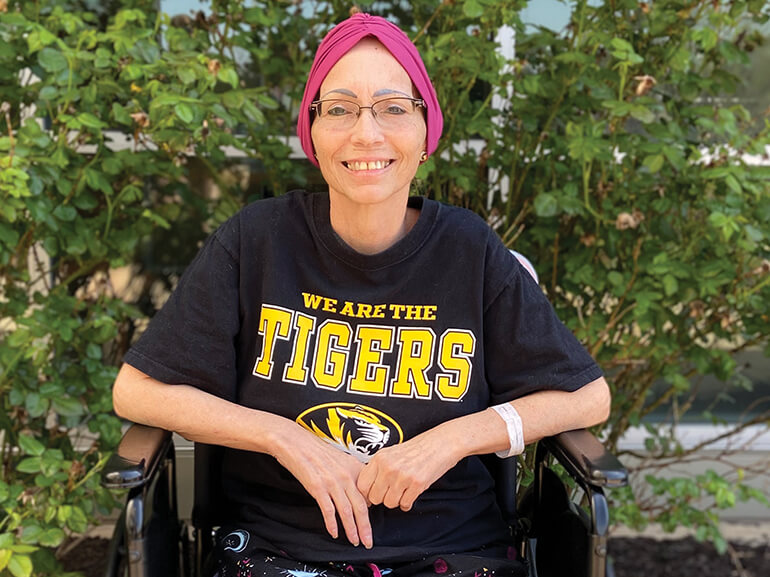Debbie's story

As a caregiver for the home care organization Visiting Angels, 60-year-old Debbie Lane, was used to helping others. But one day when she felt a mass in her abdomen, she knew she needed to reach out for help herself. She met with her doctor, underwent further testing and a biopsy, and received a scary, but treatable diagnosis: diffuse large B-cell (non-Hodgkin) lymphoma.
Debbie received chemotherapy, and shortly after her final treatment, developed pain, fatigue and other complications. As her symptoms worsened, she went to the hospital and was placed on a respirator and had a feeding tube inserted.
Her family, including three children, were told to make arrangements because doctors weren’t sure she would pull through. Debbie doesn’t recall much about her time in the hospital, except the searing abdominal pain that prevented her from walking and moving about. Despite the pain, she knew she wasn’t going to give up. She very slowly turned the corner and began to improve. Once stable, her team recommended inpatient rehabilitation. Debbie chose SSM Health Rehabilitation Hospital – Bridgeton to continue her recovery.
Upon admission, Debbie was still experiencing a significant amount of pain, even while resting. She had been immobile for so long, the muscles around her knees and ankles were tight and walking was very painful. Her main goals were to be able to walk and cook again, and she was looking forward to having her grandchildren visit her in her new home.
Physical therapists managed her leg pain and helped her to slowly begin walking again. Within a week, Debbie progressed from needing two people to help her stand to walking four feet between the parallel bars. The following week she was walking a few feet with a wheeled walker and two weeks later she was managing to cover 200 feet. She became faster and steadier with each step. She began stretching independently between therapy sessions. With her increased strength and mobility, her swelling and pain decreased.
Because Debbie was so debilitated, she struggled to perform self-care tasks while seated or in bed. Occupational therapists taught her various techniques, such as weight shifting while seated, to help her get dressed. They also introduced adaptive equipment to help pull socks on and off and a transfer board to help her move from the bed to a chair. She also used hand weights to build upper body strength and endurance.
She continued working until she could stand and get to a chair using a walker instead of the transfer board. As her balance and endurance improved, she started walking to the bathroom with a walker and got herself ready with supervision from her care team. Each day, Debbie celebrated more and more accomplishments, such as being able to independently navigate 12 steps using handrails and completing all transfers with a wheeled walker.
"When I came here I couldn’t even sit up on my own and now I am doing a lot,” Debbie said.
A high point was getting into the shower for thefirst time in weeks. It not only felt good, but was a signal that she was well on the road to recovery. Toward the end of her stay, she stood in the therapy kitchen to bake cookies. She grinned from ear to ear, thrilled to engage in one of her favorite hobbies.
After a month at SSM Health Rehabilitation Hospital, Debbie was ready to go home, accompanied by her boyfriend, who’d been by her side throughout her stay. She was looking forward to sleeping in her own bed, seeing her cats and spending time with her family.
Rehabilitation gave Debbie the confidence and strength needed to return to her daily life. She plans to continue her healing by participating in therapy at the SSM Health Day Institute.